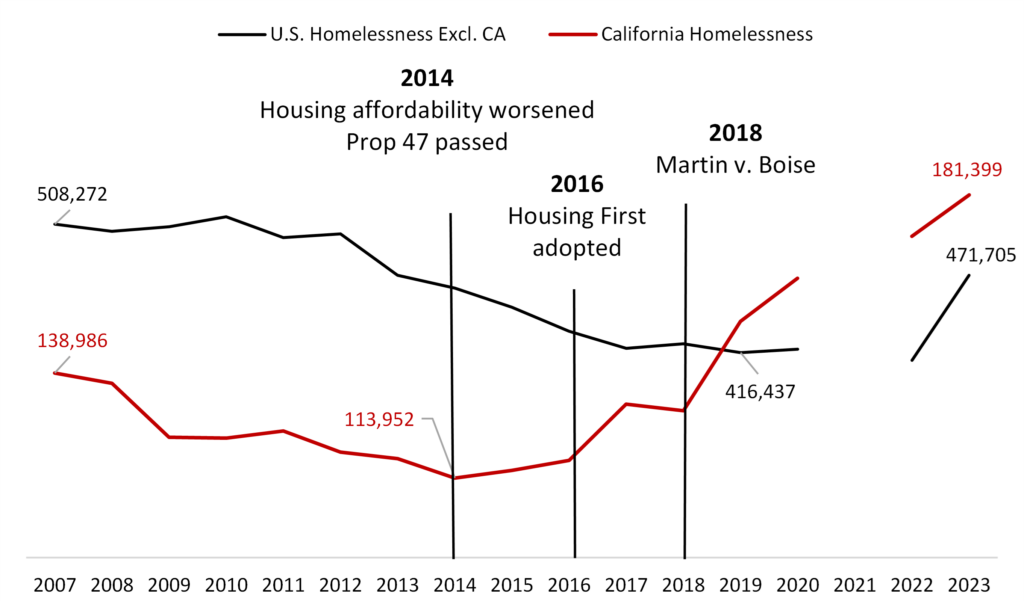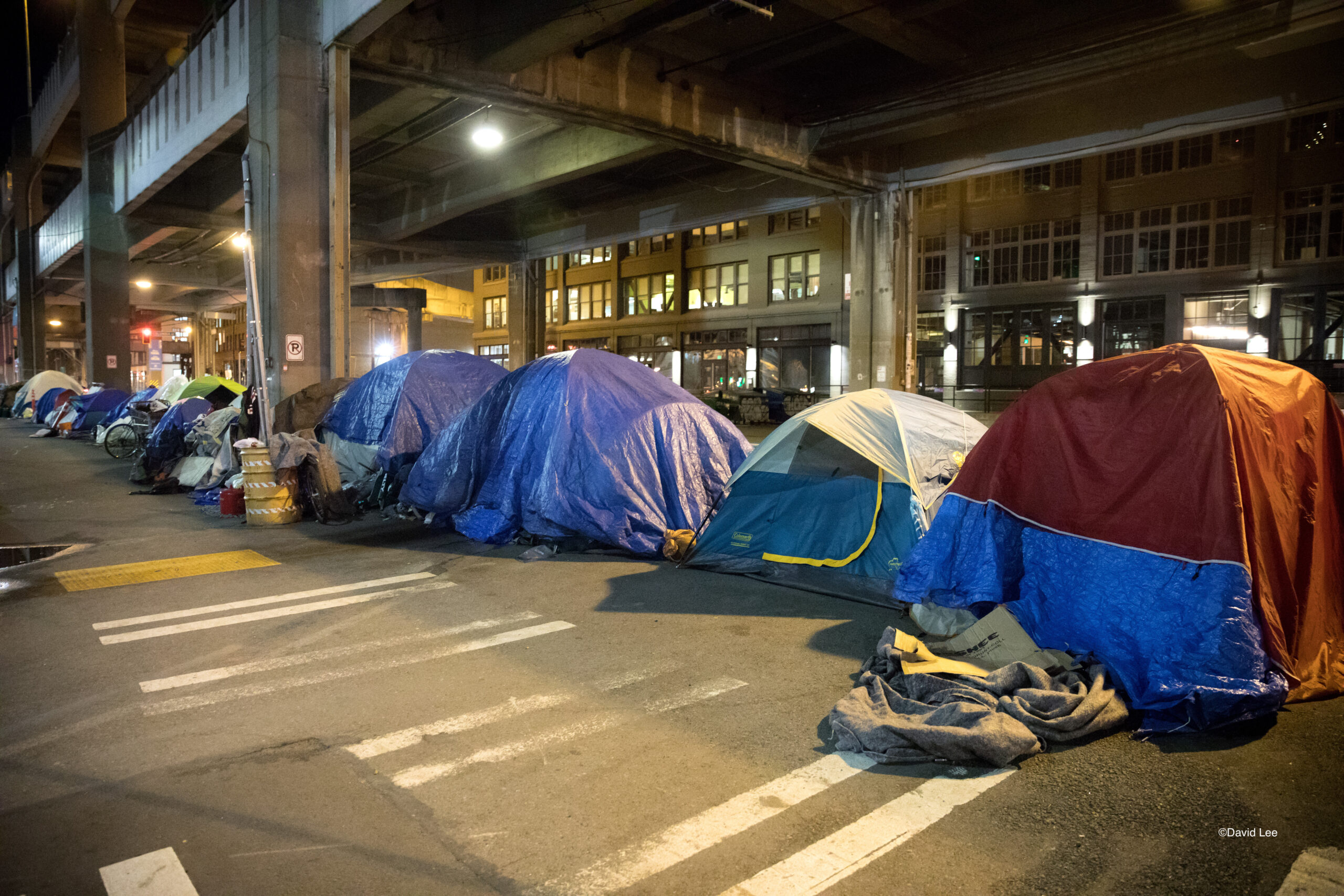
Between 2007 and 2014, homelessness declined faster in California than the rest of the country – an 18 percent total decline in California compared to a 9 percent total decline in the rest of the country. And then something happened in 2014. While the number of homeless in California began its 59 percent climb through 2023, homelessness in the rest of the country continued to decline through at least 2020. And even with the surge that followed the Covid-19 recession, homelessness between 2014 and 2023 is only up 2 percent outside of California.
California’s changing fortune starting in 2014 was caused by its wrongheaded policies. Housing affordability, which had been improving in California since the Great Recession, significantly worsened beginning in 2014. Also in 2014, Prop 47 was approved. Then California formally adopted the ineffective Housing First approach to homelessness in 2016, and finally, there is the Martin v. Boise 9th Circuit decision that was issued in 2018.
The combination of Prop 47 and the Martin v. Boise decision was particularly devastating because drug addiction and mental health problems are perpetuating the homelessness crisis. A study by California Policy Lab at UCLA found that 84 percent of unsheltered homeless reported a physical health condition, 78 percent reported a mental health condition, and 75 percent reported a substance abuse condition. A Los Angeles Times review of over 4,000 questionnaires taken by homeless individuals found similar results – that 67 percent of the unsheltered homeless were dealing with substance abuse or mental health problems.
Prop 47, which may seem unrelated, reclassified most drug offenses and theft under $950 as misdemeanors rather than felonies. While unintended, the unsurprising result has been the rampant increase in shoplifting and stealing driving retailers out of business. For the homeless struggling with drug addictions and mental health disorders, Prop 47 provided the ability to maintain a destructive lifestyle – by looting local retailers without penalty. It also eliminated an opportunity to leverage a negative interaction (i.e., potential punishment for stealing or using illegal drugs) into an opportunity to sustainably address the root cause perpetuating their homelessness.
While not a California policy per se, the 2018 Martin v. Boise decision essentially created a right to sleep on the street. Homeless individuals suffering from mental health issues or substance abuse problems were given the right to maintain a destructive lifestyle on the streets thanks to the 9th Circuit. This decision only worsened the problems created by Prop 47.
Today opportunities to reverse the homeless trends have arisen due to the Supreme Court decision in the City of Grants Pass v. Johnson and the passage of Prop 36. Grants Pass essentially overturned Martin v. Boise, reinstating states and localities’ ability to enforce no camping laws. The commonsense outcome that individuals do not have a right to live on the streets has been reasserted. Prop 36 rolled back some of the ill-advised policies of Prop 47 and passed by a huge 68 percent – 32 percent margin.
There is a major difference between Prop 36 and the Grants Pass decision (compared to Prop 47 and Martin V. Boise). These earlier changes worsened California’s homelessness problem just by being passed. These later changes will only sustainably address the homelessness problem by implementing the right follow-up policies.
Implementing the right policies starts with enforcement. The Grants Pass decision enables localities to enforce no camping laws, but it does not require enforcement. The uneven enforcement of anti-camping laws in Los Angeles exemplifies the risks. Without active enforcement, the problem of homeless encampments will persist. The same is true for Prop 36 – without active enforcement and the issuance of misdemeanor citations for their first and second offenses, law enforcement will be unable to prosecute people committing their third (and felony) offense.
Greater use of homeless courts can help address the root causes of a person’s homelessness by sentencing them to treatment rather than jail. By focusing on treatment, the homeless can receive the help and support they need and ultimately transition to a stable home and economic environment. In a positive sign, the use and support of homeless courts continue to grow. As the California courts noted, “there are currently homeless court programs in 19 California counties. Most of the existing courts are held at least monthly with many holding court weekly.” Expanding these courts to all counties and holding court more often can accelerate the benefits.
It’s not just negative incentives that are important. Establishing day rooms to create positive interactions where staff can help transition homeless individuals into the appropriate services is also essential.
Then there is the need to provide more and better housing for the homeless at a lower cost. Low-cost temporary housing communities, such as those provided by organizations such as DignityMoves, already provided higher quality temporary housing that provides homeless with a higher quality living arrangement that is private, safer, can accommodate pets, and costs a fraction of the typical affordable housing units.
With these strategies in place, the state would be better positioned to leverage the opportunities enabled by the passage of Prop 36 and the Grants Pass ruling. Such an approach will not only help alleviate the current homelessness crisis, but it will also improve the quality of life for Californians and enhance the economic viability of cities across the state.
Dr. Wayne Winegarden is a senior fellow in business and economics at the Pacific Research Institute.

